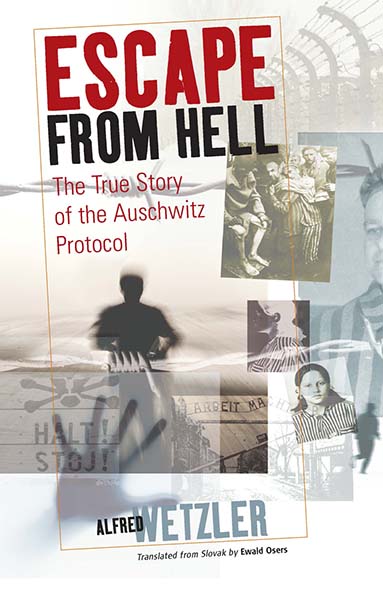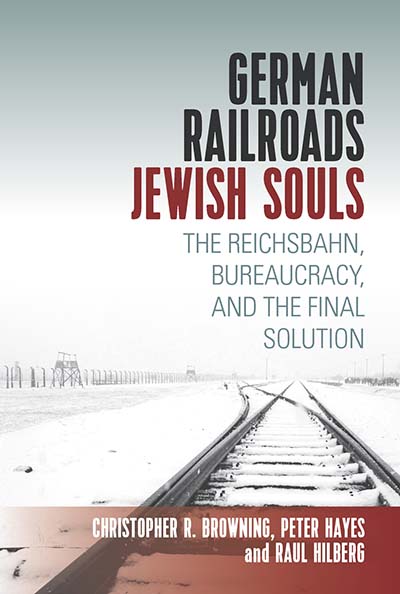-
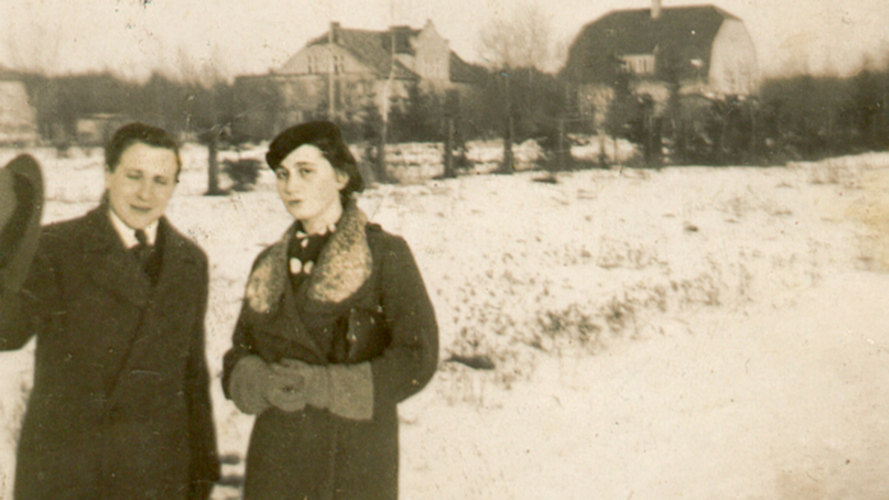
0.1 Manfred Goldfish and Malka Goldfish (later Wagschal nee Golding) a year before leaving Germany for Trinidad in 1937. From The Last Goldfish. Umbrella Entertainment, 2017. Screenshot. Published with permission.
-
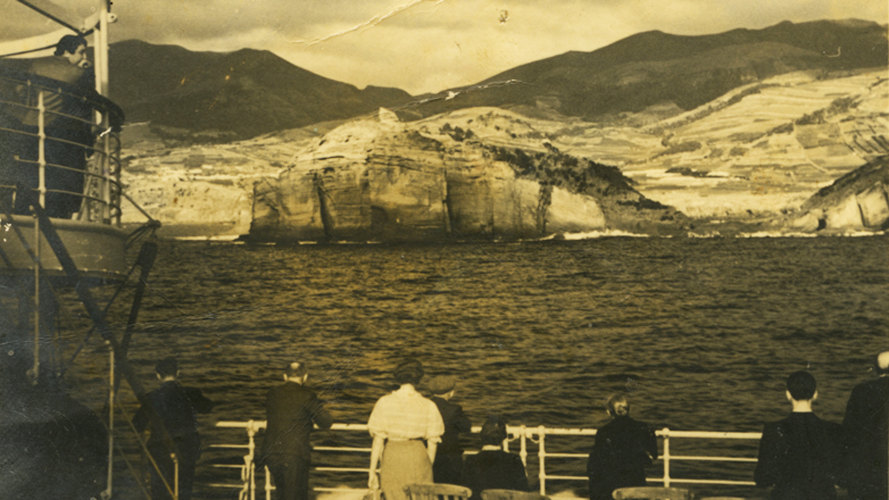
0.2 View from the SS Cordillera (1938). From The Last Goldfish. Umbrella Entertainment, 2017. Screenshot. Published with permission.
-
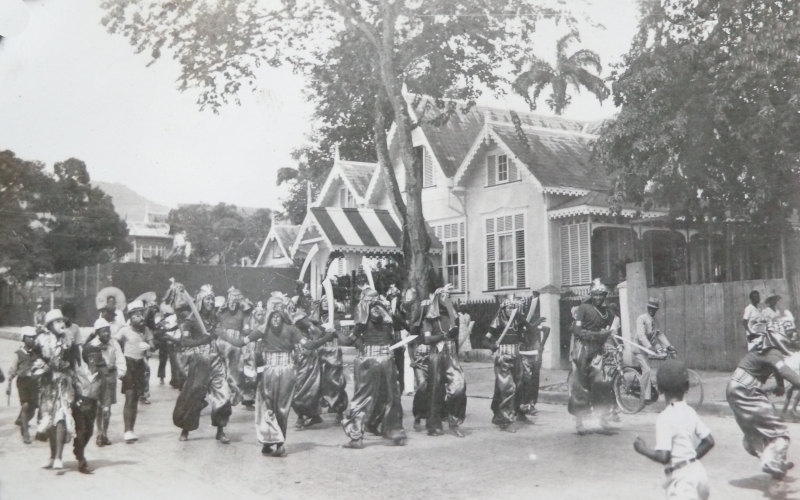
0.3 Image of Carnival. Photograph by Hans Stecher. By kind permission of Hans Stecher.
-

3.1 The Tauscher family, recently arrived, pose with a Trinidadian family. Photograph 79548, courtesy of the U.S. Holocaust Memorial Museum.
-

3.2 The Tauscher family pose outside in Trinidad where they arrived as refugees. Photograph 75938, courtesy of the U.S. Holocaust Memorial Museum.
-

3.3 The site of Duke Street Synagogue, as shown to the author by Hans Stecher in 2001. Photograph by the author.
-
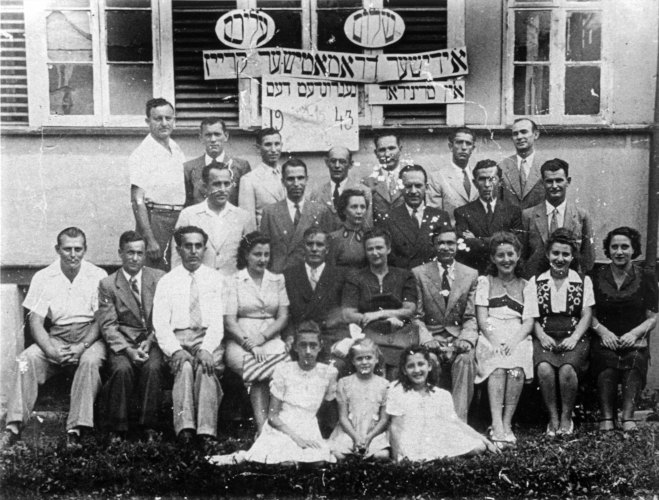
3.4 Jewish Dramatic Group, Trinidad and Tobago, 1943. Front row: Gizi Feiner, unknown, Nunia Sadovnik. Second row: Yasha Medvejer, unknown, Aron Szydlowicz, Biba Schecter, Samuel Oszslack, Ronea Rabinovitch, Moye Zonensein, Thora Yufe, Lorna Yufe, unknown. Third row: Buze Schechter, Leo Katz, Golda (Gusta) Zonensein, Salo Gross, Bubi Schneider, Willy Turkenwiez. Back row: Mr. Bialogorodsky, Idel Rabinovitch, Moishe Steinbok, Egon Huth, Reynold Strasberg, unknown, Michael Strasberg. Names provided by Libby Ellyn’s mother, Lorna Yufe, and Zeno Strasberg. By kind permission of Hans Stecher.
-

3.5 Group photograph of about fifty children with their Hebrew and Jewish religion and history teacher Fanny Lapscher in Port of Spain. By kind permission of Hans Stecher.
-
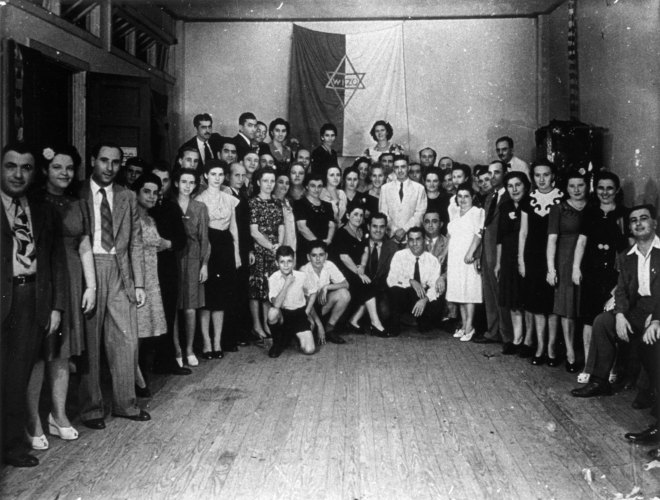
3.6 Photograph of Chuma Averboukh, President of Trinidad’s Women’s International Zionist Organisation (WIZO), on left at back of picture. Photo taken in the Averboukh’s Park Street business place. By kind permission of Hans Stecher.
-
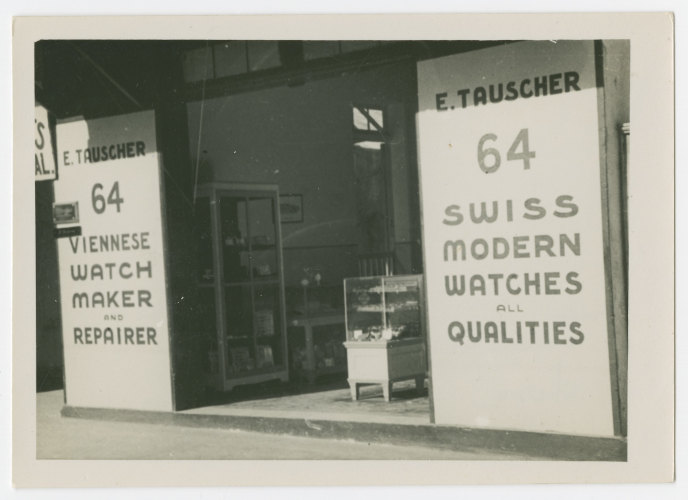
3.7 Exterior view of the watch store belonging to Erich Tauscher, a Jewish refugee in Trinidad. Tauscher re-established his enterprise on 77 W. 46 St (corner of Sixth Avenue) in New York, advertising himself as being ‘fr. Wien u Trinidad’(adverts in Aufbau vol. 39, no. 39 [24 September 1948] and no. 41 [8 October 1948]). Photograph 75945, courtesy of the U.S. Holocaust Memorial Museum.
-

4.1 Portrait of a teenage Rudolf Hockenheimer by G.W. Mooy, courtesy of the U.S. Holocaust Memorial Museum.
-

5.1 View of internment camp on Nelson Island, 2001. Photograph by the author.
-

5.2 ‘Trinidad’, sketch by Helen Breger in Lines, A Sketched Life, USA 2009, p. 14. Published with permission.
-

5.3 A group of Jewish refugees pose on the pier in the port of Lisbon before boarding the SS Serpa Pinto. Photograph 59617, courtesy of the U.S. Holocaust Memorial Museum.
-
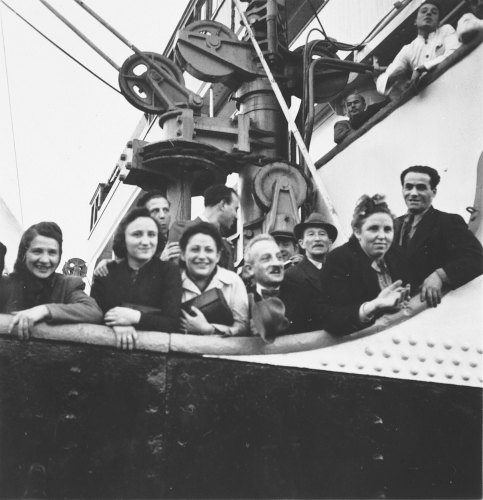
5.4 Jewish refugees look out from the deck of the SS Serpa Pinto before its departure from the port of Lisbon. Photograph 59619, courtesy of the U.S. Holocaust Memorial Museum.
-
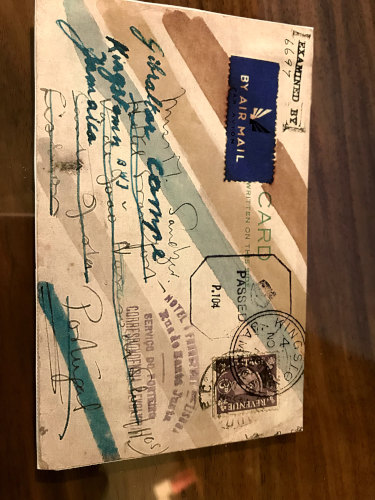
5.5 Postcard from England posted in March 1942 to Lisbon, Portugal, and redirected to Gibraltar Camp, Kingston, Jamaica, where it arrived on 4 November 1942. It was censored by the British and had chemical wash lines to see if there was any secret writing. Courtesy of William Kaczynski’s Collection.
-

5.6 Fred Mann and his parents at Gibraltar Camp, Jamaica. Left to right: his father, Emanuel; Fred; and his mother, Zelda. Courtesy of the Azrieli Foundation.
-
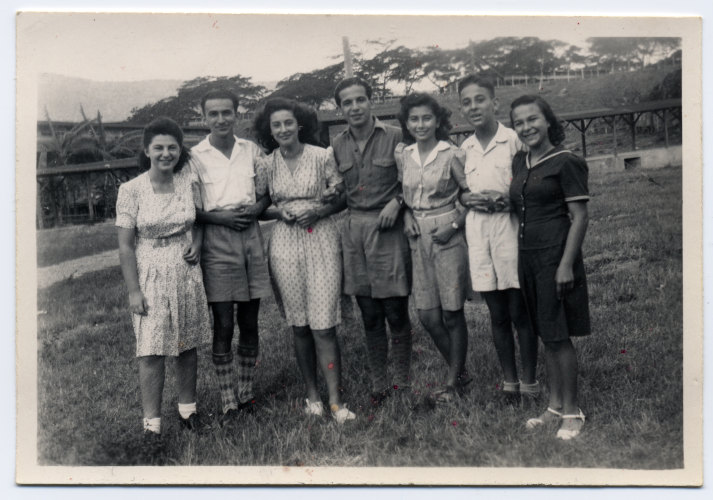
5.7 Fred Mann (centre) with friends in Jamaica. Courtesy of the Azrieli Foundation.
-
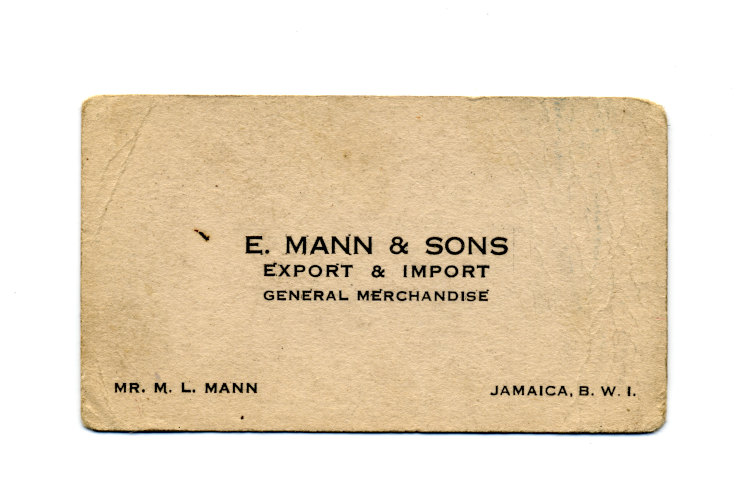
5.8 Business card for the export business that Fred and his father, Emanuel, operated in Jamaica from 1944 to 1948. Courtesy of the Azrieli Foundation.
-

6.1 and 6.2 Two photographs of still standing parts of the original Gibraltar Camp, taken in 2001 by the author.
-

6.1 and 6.2 Two photographs of still standing parts of the original Gibraltar Camp, taken in 2001 by the author.
-
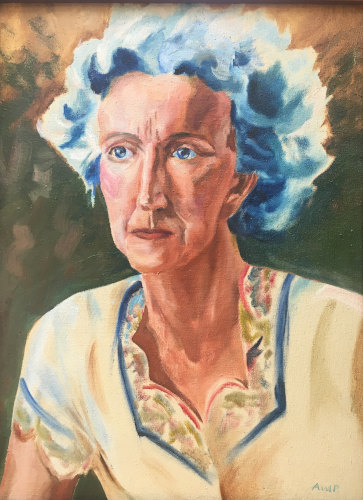
6.3 Portrait of Edna Manley by Arnold von der Porten. Photograph courtesy of Professor Jeffrey Giles.
-
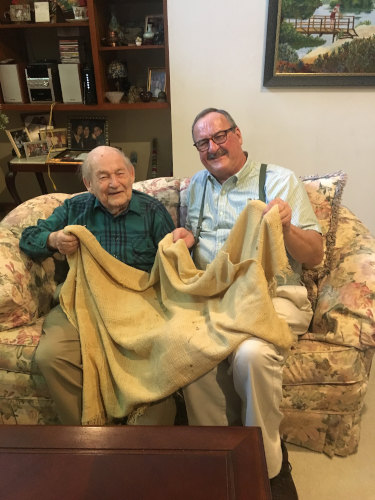
6.4 Arnold von der Porten, with Professor Jeffrey Giles, at his home in Gainesville, Florida, holding a blanket made in the internment camp with a loom made from barbed wire and fence posts, 12 April 2019. The blanket is still in remarkably good condition after eighty years. Photograph courtesy of Professor Jeffrey Giles.
-
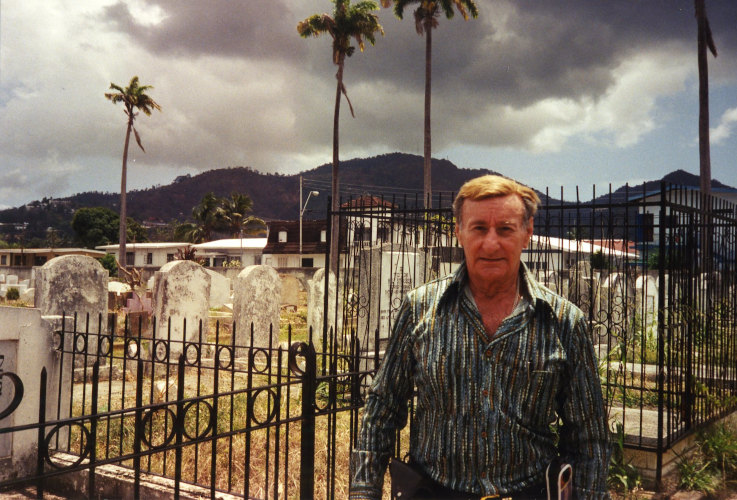
6.5 Hans Stecher, at the Jewish graveyard in Port of Spain, Trinidad. Photograph by the author, 2001.
-
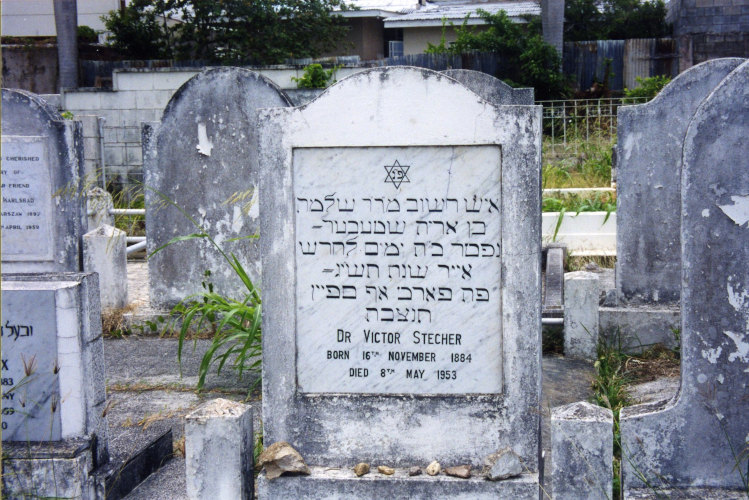
6.6 Gravestone of Hans Stecher’s father, Dr Victor Stecher, in the Jewish cemetery, Port of Spain, Trinidad. Photograph by the author.
-
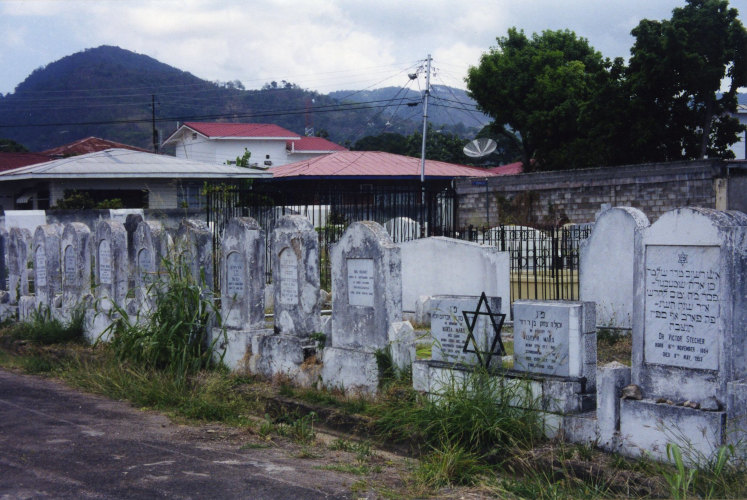
6.7 Jewish section of the graveyard in Port of Spain, Trinidad. Photograph by the author.
-
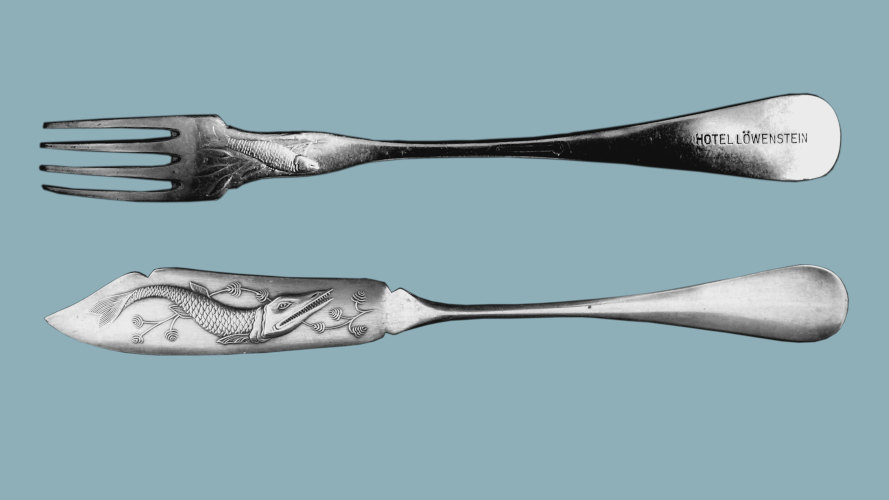
6.8 Photograph of the fish knife and fork given to Su Goldfish by her sister Marion Wagschal, from Hotel Lowenstein. Photograph given to author with kind permission by Su Goldfish.
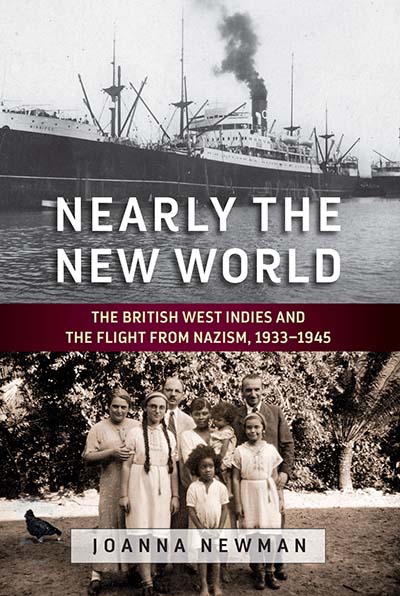
Email Newsletters
Sign up for our email newsletters to get customized updates on new Berghahn publications.
Nearly the New World
The British West Indies and the Flight from Nazism, 1933–1945
Joanna Newman
320 pages, 27 illus., bibliog., index
ISBN 978-1-78920-333-2 $135.00/£104.00 / Hb / Published (September 2019)
ISBN 978-1-78920-649-4 $24.95/£19.95 / Pb / Published (September 2019)
eISBN 978-1-80758-581-5 eBook
Reviews
“In this rich and resonant study, Joanna Newman recounts the little-known story of this Jewish exodus to the British West Indies from the 1930s to the end of the war ... Through a vivid combination of letters, memoirs and interviews, we learn of the tremendous efforts the newly arrived Jews went to in an attempt to rebuild their shattered lives and recreate something of the Europe they had left behind”. • Times Higher Education
“Nearly the New World is a sober, balanced, and deeply nuanced study of the Jewish refugee crisis of the 1930s, the reception of Jews in the West Indies on the eve of decolonization, and the British imperial policies that flowed through it all. Newman uses this history to speak effectively, and without anachronism, to address the current refugee crisis, breaking free from the usual sterile confines of standard academic histories.” • Israel Journal of Foreign Affairs
“The volume fills some important gaps in Jewish and Caribbean studies by extending understanding of the nature of diaspora communities from the previous focus on Irish, African, South Asian, and Middle Eastern groups to include the under documented Jewish, and particularly Ashkenazi, presence in the British West Indies. It also contributes to understanding of the history of migration as an important constant in the life of the Caribbean.” • The Round Table: The Commonwealth Journal of International Affairs
“The work adds significantly to the budding scholarship on World War II and the Caribbean and brings to light the history of a people who have made significant contributions to a challenged but developing region.” • Central European History
“…a study very much worth reading, clearly structured and enriched with personal illustrative material. Newman clearly achieves her goal to produce a ‘connected history,’ in which histories of the Caribbean, of refugees, and the Holocaust are linked together.” • H-Soz-Kult
“Joanna Newman has done a remarkable job of rescuing an otherwise little-known story of the Holocaust, and her book is to be recommended to those seeking to learn something of the history of Holocaust rescue beyond that reserved for the countries where immigration was a given and refugee resettlement was expected.” • The Journal of British Studies
“[This] book is a tour de force covering uncharted territory, exploring aspects that perhaps most readers had never thought about. As always, the historic photos and human-interest stories are fascinating and the detailed notes about sources will be of particular interest to academics.” • Association of Jewish Refugees Journal
"A genuinely untold story doesn’t surface too often, but when it does, it’s best to pay attention. Joanna Newman’s diligent and scholarly excavation of Jewish refugees in the Caribbean is a revelation. It adds to what we know about the fate of those who fled the Holocaust; but it is also an excellent primer on colonial history. And it introduces us to a gallery of fascinating characters, many of whom exhibit a characteristic Caribbean mixture of courage, cunning and determination" • Trevor Phillips
“Nearly the New World is a richly researched book that addresses a key gap in the historiography of World War II—the forced migration of Jewish refugees to the British West Indies. It is a timely work that will make an invaluable contribution to the scholarly literature on Jewish refugees from the Nazis, Jews in colonial spaces, and the Jewish Caribbean in particular.” • Sarah Phillips Casteel, Carleton University
“Joanna Newman’s Nearly the New World is a remarkable achievement. It is the first full study of Jewish refugee movements to the British Caribbean and for that alone it is of immense value. But the significance of this book is much greater. In the field of Holocaust studies it acts as a model, bringing together perspectives from the British imperial government, Jewish refugee organisations, local responses and the experiences of the refugees themselves. It is also a wonderful example of a historian creatively curating sources, ranging from Colonial Office minutes through to the rich resource of Trinidadian calypsos, to explore the history and memory of this neglected topic. For those in refugee studies it is also an important intervention, with the persecuted at the forefront of her study. The author makes clear the connections between the refugees at sea in the Nazi era to find a place of safety and those on migrant boats today. This is a compelling story, beautifully told.” • Professor Tony Kushner, Parkes Institute, University of Southampton and author of Journeys from the Abyss: The Holocaust and Forced Migration from the 1880s to the present (2017).
“This book offers an unusual angle of vision on the tragic history of Jews in flight from Europe before and during the Second World War. Joanna Newman shows how British officials and West Indians as well as refugees themselves reacted to the forced emigration of victims of Nazi oppression. She tracks the miserable record of the colonial bureaucracy through a multitude of archives. For the first time, she exposes the scandal of deliberate under-utilization of available refugee camp facilities in Jamaica during the war. Throughout, she injects a human dimension with evidence from letters, memoirs, and interviews. We learn how Jews disembarking in the West Indies were greeted with calypsos, some expressing sympathy at their plight, others resentment at their uninvited arrival. Admirably researched, deeply thoughtful, and wonderfully readable, this book has a vital message for the worldwide humanitarian crisis of our own time, as a new generation of asylum seekers knocks desperately at our doors.” • Bernard Wasserstein, University of Chicago
Description
“In this rich and resonant study, Joanna Newman recounts the little-known story of this Jewish exodus to the British West Indies...”—Times Higher Education
In the years leading up to the Second World War, increasingly desperate European Jews looked to far-flung destinations such as Barbados, Trinidad, and Jamaica in search of refuge from the horrors of Hitler’s Europe.
Nearly the New World tells the extraordinary story of Jewish refugees who overcame persecution and sought safety in the West Indies from the 1930s through the end of the war. At the same time, it gives an unsparing account of the xenophobia and bureaucratic infighting that nearly prevented their rescue—and that helped to seal the fate of countless other European Jews for whom escape was never an option.
From the introduction:
This book is called Nearly the New World because for most refugees who found sanctuary, it was nearly, but not quite, the New World that they had hoped for. The British West Indies were a way station, a temporary destination that allowed them entry when the United States, much of South and Central America, the United Kingdom and Palestine had all become closed. For a small number, it became their home. This is the first comprehensive study of modern Jewish emigration to the British West Indies. It reveals how the histories of the Caribbean, of refugees, and of the Holocaust connect through the potential and actual involvement of the British West Indies as a refuge during the 1930s and the Second World War.
Joanna Newman is Provost at SOAS, University of London. She was Vice Principal (International) at King’s College London and a Commonwealth Trust Commissioner and was awarded an MBE for services to British higher education in 2014. She is a regular speaker on issues relating to higher education and internationalization.
Joanna Newman interview in The Observer.

